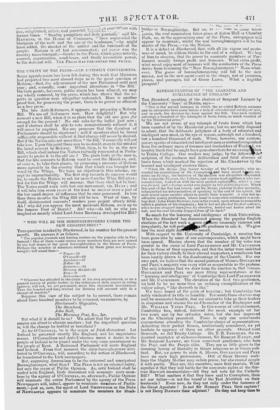"WHO WILL BE THE BOROUGHMONGERS UNDER THE NEW CONSTITUTION ?
"
Tisis question is asked by Blackwood, in his number for the present month. He answers it as follows.
"The popular journals and leading orators on the popular side in Par- liament! One of them would return more members than are now named by any half-dozen of the great boroughholders in the House of Peers. Perhaps the number of members returned by these great new borough- mongers will stand thus- " Times-72 O'Connell—GO Spectator-37 Ballot-35 Examiner-32 filorning Herald-22 Sun-19 Scotsman-13 "Whoever has attended in the circle of his own acquaintance, or on a general survey of public bodies, to the influence of daily papers in ruling opinion, will not, we are persuaded, deem this statement overcharged. Thus the boasted and long-wished for Reform will amount only to a change of masters."
Suppose this view of the subject to be correct, there remain about three hundred members to be returned, we conceive, by Blackwood' s Magazine, The Standard, John Bull, The Morning Post, &c., &c.
But what if it should he so ? We admit that the people of this empire are about to change masters.; but the important question is, will the change be hurtful or beneficial ? As for O'CONNELL, he is the organ of Irish discontent. Let Ireland be governed exactly like England, and his importance ceases. 0-Connellism and Anti-Unionism mean a desire in the people of Ireland to be placed under the very same government as the people of Kent. A Reformed Parliament will unite England and Ireland. From that moment the sixty-borough-power attri- buted to O'CostsrELL, will, according to the notion of Blackwood, be transferred to the Irish newspapers.
But, supposing Journalism to be the universal and omnipotent
Boroughmonger, what then ? The Press is not an original entity, but only the organ of Public Opinion. As, until Ireland shall be united with England, Irish discontent will nominate sixty mem- bers by the agency of O'CONNELL, SO, afterwards, Public Opinion will nominate the entire Parliament by the agency of the Press. Newspapers will, indeed, appear to nominate members of Parlia- ment,—just as, now, the agent of Lord GROSVENOR or the Duke Of NEWCASTLE appears to nominate the members for .Stock- f
bridge or
.'
Boroughbridge. But as, n4e 01 Loose nouie
isords, the real nomination takes place at Eaton Hall or Clumber- Park, so, in the approaching case of the Press, newspapers win appear tosnominate, whilst the real boroughmongers will be the master of the Press,—viz. the Nation.
It is a defect of Blackwood, that, with all his vigour and acute- ness of mind, he seldom thinks to the end of a subject. We beg of him to observe, that the power to nominate members of Par- liament usually brings profit and honours. What extra profit, what novel enjoyment of honours will the conductors of the Press derive from becoming the "New Boroughmongers ?" None what- ever. The gains of boroughmongering will fall to the new master, not to the new agent—and in the shape, not of pensions, places, mid peerages, but of G000 Laws. What a frightful prospect !



























 Previous page
Previous page